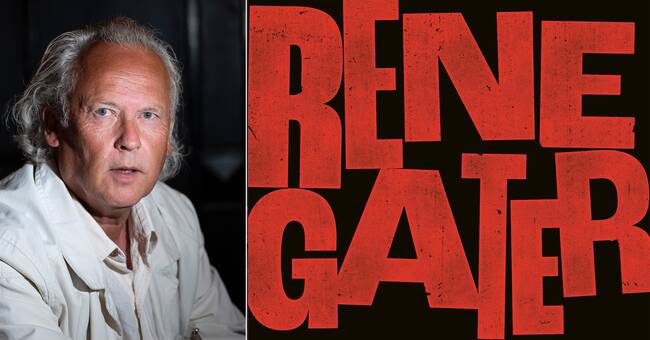Partisans and renegades.
In Klas Östergren's once gloomy and romantic novel world, people are never cast in one piece.
Instead, vault after vault within them, and fiction flies like both an angel and Harry Potter's dementor through vaults, close to the roof, close to the ground, always from unexpected corners or secret maple rooms.
Reading the trilogy that is now
tied together after 40 years - from the breakthrough Gentlemen of 1980 who taught a generation what lugubrious feelings can do to people and their society, to the gangster's metal literary display and unmasking in 2005, to the new Renegates - is like going to a party who likes one.
Only occasionally do values disappear to refill wine, and one casts a distracted glance at the clock.
You should break up, but what can you not miss?
Everyone has by now heard how it starts: the author Klas Östergren stands at the gate to his Scanian farm and watches.
It is an obscure internal reconnaissance, carried out by those whom society would not yet call a risk group, but who anxiously identify themselves as such.
The narrator Östergren who fears the gate money there in the idyll.
In a sense, he has moved the field.
Was that right?
Then comes someone who has not got lost.
On the contrary.
Henry Morgan frees himself from
fiction and turns out to have a mission from the silent powerful rulers who rule the world by dividing and ruling.
Klas Östergren, who for a short time - from the perspective of eternity ridiculous four years - sat in the Swedish Academy on chair number 11, is required to tell a story about what happened to the secret society during the famous scandal that broke out in 2017. It is an offer he can not say no to, just as it takes proper deafness to not listen to one's conscience.
Östergrens, in my eyes best novel, is the sad In a forest of sumac.
Harder restrained, he let the shadows darken without being distracted by too many anecdotes and time details.
As if Stig Dagerman stepped in and adapted the future catastrophes in the text, and Östergren's narrator was left with the same subtle smile as always, and that is precisely why the pain became deeper.
It is as if that novel, together with the investigation of the side effects of betrayal in Twist, has been emptied like distillate into a jug of water and become Renegates.
Still a big party to come to, but the guests are several, you do not get the same attention.
At the same time, it feels like a feast for equality: this is a fictional sweep around a past country that is no longer - not depicted in the oblivion of nostalgia - where unforgivability is quickly forgotten for new scandals, revelations and the daily wretched judgment of politicians and rulers with the speed of social media.
Remember them, the novels urge.
It is a man who tests his feelings who tells the story of a man who tests his feelings for the right, the true, the beautiful.
Was everything just an illusion?
A trick for those who are not old enough to see through the world?
But it is also a - loving - sweep around the development of literature, and the value of enlightenment.
Therefore, the novel falls apart
into several parts, including a treacherously seductive essay on snow, a long description of the ugly Jas affair in 1999, where Sweden with bribes and cultural varnish sold arms and power to South Africa, and so the already described "Report" as is about the Swedish Academy's battle 2018.
There, all members are given grass names so that they wave to the reader, bend, stick, camouflage their invasive power with brittle flowers - all that grass can do.
There's a bit of Elsa Beskow about it, and Herr Blå is then perhaps the narrator's, "Klas Östergrens", the voice that thoughtfully remembers his past in the Old Town where he has been everywhere except in Börshuset, so why not accept that offer.
The harvests of chance lead right into a new chapter of illusions of losing.
And then the events erupt as if from a rock sleeve, into the story of how a man comes wandering, even though he does not exist, and then makes a garden flourish by re-evaluating an old water well.
Partisans, defectors, renegades, so called those who betray, or who are faithful to another, higher mission.
The nature that betrays the thing, or themselves, is Klas Östergren's habitus and foundations.
For a long time, I'm not sure if he's writing entertainment or tragedy here (the academy section is definitely a dirty tragedy), but of this enlightenment enlightenment project, it probably smells, apart from roses, most sad.
For the reader, it is a promise of a clarification for the evening.

